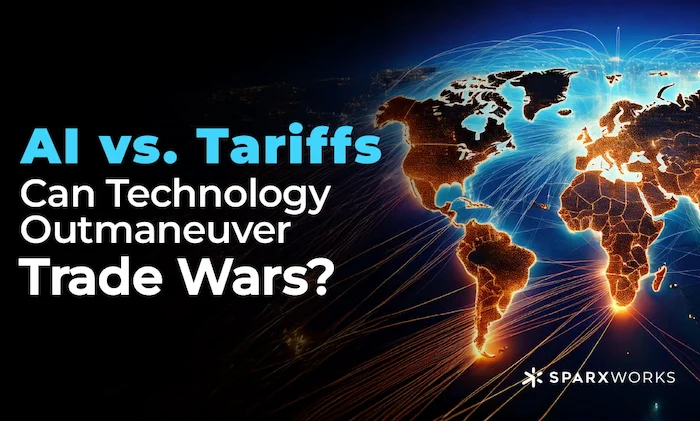AI vs. Tariffs: Can Technology Outmaneuver Trade Wars?
05 Mar 2025, Posted by in AI, Technologies
Politics has always played a role in business—mostly influencing investors and big decisions—but today, the impact cuts much deeper. It’s creating stress on the workforce in ways we haven’t seen before and leaving millions of SMBs wondering what their next move should be.
The latest challenge? Tariffs. SMBs don’t have the power to influence policymakers, so the next best thing is to focus our energy where it counts. That got me thinking—can AI help mitigate the impact of tariffs?
I spent some time researching the latest trade policies—like the 25% duties on Canadian and Mexican imports and additional levies on Chinese goods—and it’s clear that businesses are bracing for increased costs and operational uncertainty. But then I stopped and asked: What if AI could help turn these challenges into strategic advantages?
Here are five ideas where I think AI can help companies stay ahead of shifting trade policies:
1. Optimizing Supply Chains
- Smart Sourcing: AI-powered analytics scan global supplier networks to identify alternative markets with lower or no tariffs, ensuring businesses can pivot quickly.
- Logistics Optimization: Machine learning models predict lead times, suggest cost-effective routes, and minimize freight expenses to mitigate tariff-driven cost increases.
2. Dynamic Pricing & Cost Management
- Real-Time Pricing: AI tools track raw material costs, currency fluctuations, and tariff changes to adjust pricing dynamically, helping businesses protect their margins.
- Predictive Demand Forecasting: AI-driven models analyze trade trends and economic indicators to optimize inventory and production planning and prevent costly overstocking.
3. Risk Analysis & Scenario Planning
- Automated Risk Monitoring: AI processes vast amounts of global trade data, economic signals, and policy updates to detect potential tariff risks in advance.
- “What-If” Simulations: AI-driven models can assess the financial and operational impacts of different tariff scenarios, helping businesses plan proactively rather than reactively.
4. Regulatory Compliance & Paperwork Automation
- AI-Powered Regulatory Intelligence: Machine learning tools can simplify complex trade regulations, ensuring companies stay compliant while reducing manual efforts.
- Automated Documentation: AI streamlines customs paperwork, updating forms and filings dynamically as trade policies evolve.
5. Negotiation & Contract Strategies
- Data-Driven Contracts: AI-driven insights empower businesses in supplier negotiations, supporting decisions like shorter contracts or flexible clauses tied to tariff fluctuations.
- Cost-Share Models: AI helps businesses identify opportunities to distribute tariff-related costs across supply chain stakeholders, easing the financial burden.
The Big Picture
With market reactions to tariffs already impacting stock performance and economic forecasts, businesses must act now. AI is not just a tool for efficiency—it’s a strategic asset that helps organizations adapt, minimize costs, and maintain resilience in the face of unpredictable trade policies.
Bottom Line
Tariffs introduce uncertainty, but AI provides clarity. Companies that leverage AI for supply chain agility, pricing intelligence, and risk mitigation will have the upper hand in an evolving trade landscape.


Sorry, the comment form is closed at this time.